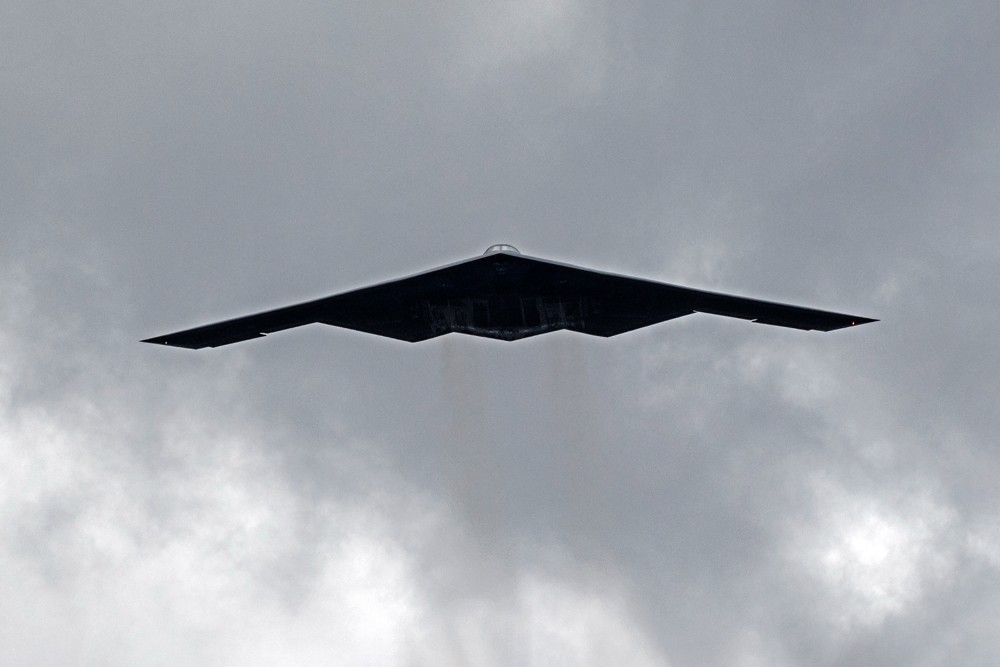The church cannot bless war
A Christianity that affirms the state’s wars is not Christianity. It is idolatry.

Photo: KGrif / iStock Editorial / Getty
In the early morning of June 22, American bombers bombed Iranian targets, and just like that, war has come that many warned would. How long will it take before the church responds?
As with all war, we turn to prayer, and yet, too often, that prayer is quiet enough to be mistaken for approval. The church is not the chaplaincy of empire. The church is the body of Christ. The church does not serve the interests of statecraft. The church serves the kingdom of God. And as such, we do not respond to war with worry or with patriotism. We respond theologically, with clarity, compassion, and a call to speak the truth about violence and our participation in it.
The Theological Declaration of Barmen, written in 1934 to protest the Nazi-influenced German Christian movement, begins this way: “Jesus Christ, as He is attested for us in Holy Scripture, is the one Word of God which we have to hear and which we have to trust and obey in life and in death.” The Word has not changed. It confronts every power that seeks to take the church’s allegiance from Christ, even powers that come wrapped in a flag and quoting familiar scripture.
Right now, Christians in America are being asked—explicitly and implicitly—to believe that this war is necessary. That it is defensive. It is to prevent a nuclear disaster. We realize that some think “Just War” is a defensible position for Christians. Questions around Just War are indeed complex. Yet even on Just War grounds, what has happened is inconsistent with that position. The bombs that were used are not Just War weapons any more than nuclear weapons are. So it is that all claims cannot be accepted uncritically, especially when they remain unproven.
Christianity demands more than private values or partisan identity. It requires a public witness. And in a time of war, that witness includes a refusal to allow the state to define righteousness on its terms. When we do that, we are not practicing discipleship—we are participating in civil religion. A Christianity that affirms the state’s wars is not Christianity. It is idolatry.
War does not merely take lives; it reshapes moral communities. For Christians, formed by the Gospel of peace, the refusal to kill is not a sign of weakness but a witness. Yet war demands that we abandon this witness, that we exchange enemy-love for lethal obedience. It trains us to believe that killing can be virtuous, that moral formation must bend to national survival. In doing so, war exacts a deeper cost than death—it asks us to surrender a central claim of our discipleship. The most considerable sacrifice war demands is not the loss of life, but the loss of our reluctance to kill.
That moral break—the one that trains people to quiet their conscience, override their mercy, kill without hesitation—damages the soul. And those wounds don’t stay on the battlefield. They come home with soldiers. They sit next to us in the pews. They show up in stories of moral injury and spiritual fatigue. When we honor soldiers for taking life and expect silence for the toll it takes, we reinforce the lie that violence can be holy and has no individual or corporate spiritual costs. We sin against the Gospel.
So we pray. But we pray differently. We pray as people who lament this war and the stories told to justify it. We pray for those who have died and those who will die. We pray for soldiers, not with amorphous calls for safety, but with genuine concern for their hearts and their spiritual health. And we pray for the church—that it would be a place where truth can be told, where wounds can be named, and where the peace of Christ is not just a word but a way of life.
This doesn’t mean we, as the church, blame soldiers. It’s quite the opposite. As one Christian body, we walk with them, we listen to them, we learn from them. We love them enough to tell the truth. We don’t expect them to carry the weight of our silence. We expect the church to carry the weight of their healing.
This war with Iran, like so many wars before it, will be cast as regrettable but necessary. But necessity is not the church’s measure of morality; faithfulness is. And faithfulness to Jesus Christ—who loved his enemies, who refused to bring violence to them, who forgave those who killed him—gives no room for supporting acts of aggression cloaked in the rhetoric of security.
There will be calls for clarity, but those calls will be met with calls for unity. There will be calls for unity, which are often calls for silence. Silence is not neutrality. It is consent. Let us be clear: we do not consent.
We will not bless these bombs. Our faith is deep and strong enough to bear the burden of not approving something morally while loving all people harmed on both sides and serving those who serve. We believe in a church that is against war in its theology and theory and practices peace in its life together. We believe in a Gospel that does not need missiles to make it real.
And we believe in a Christ who still calls his followers to love beyond borders, beyond fear, and beyond the rationalizations of empire. Christ for the world, we sing! War is a failure of imagination.
The church is supposed to be an alternative. Let us live like it.





